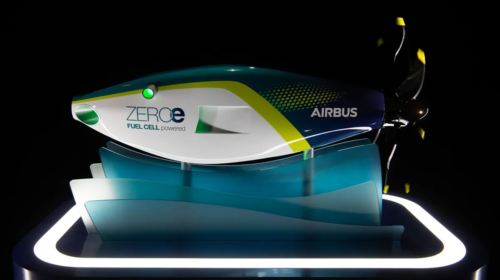On Wednesday, Airbus revealed in a press release that it was developing a hydrogen-powered fuel cell engine as one of the potential solutions to equip its zero-emission aircraft that will enter service by 2035.
The next steps will be for Airbus to start ground and flight testing this fuel cell engine architecture onboard its ZEROe demonstrator aircraft. The A380 MSN1 flight test aircraft is currently being altered to give it the capacity to carry liquid hydrogen tanks and their distribution systems.
Fuel cells are a potential solution to help us achieve our zero-emission ambition and we are focused on developing and testing this technology to understand if it is feasible and viable for a 2035 entry-into-service of a zero-emission aircraft,” said in the statement Glenn Llewellyn, VP Zero-Emission Aircraft, Airbus.
Fuel cell engines
“At scale, and if the technology targets were achieved, fuel cell engines may be able to power a one hundred passenger aircraft with a range of approximately 1,000 nautical miles. By continuing to invest in this technology we are giving ourselves additional options that will inform our decisions on the architecture of our future ZEROe aircraft, the development of which we intend to launch in the 2027-2028 timeframe.”
Airbus further said it turned to hydrogen to power a zero-emission aircraft, because it emits no carbon dioxide when generated from renewable energy, with water being its most significant by-product. In addition, hydrogen fuel cells increase their power output allowing scalability especially when stacked together.
In October 2020, Airbus created Aerostack, a joint venture with ElringKlinger, a company with over 20 years of experience as both a fuel cell systems and component supplier. In December 2020, Airbus presented its pod-concept, which included six removable fuel cell propeller propulsion systems.
DisruptiveLab
Finally, more recently, in November 2022, Airbus unveiled its DisruptiveLab, a new flying laboratory designed to test technologies destined to improve aircraft performance and to reduce helicopters’ CO2 emissions.
The DisruptiveLab goes another step further in Airbus Helicopters’ ambitious strategy to reduce the environmental impact of its helicopters and to lead the way towards a sustainable aerospace industry,” said Bruno Even, CEO of Airbus Helicopters.
“The innovative architecture and the fully parallel hybrid propulsion system could only really be tested on a brand new demonstrator in order to verify the combined impact in CO2 reduction which could be as much as 50 percent, ” he added.
The DisruptiveLab will analyze a new aerodynamic architecture intended to reduce fuel consumption, as well as explore the implementation of hybridization with a fully parallel hybrid propulsion system that enables the battery to be recharged in-flight. The new demonstrator will take to the skies before the end of 2022 in order to begin flight testing and maturing these new technologies.
Last week, we reported that Airbus was engineering novel cryogenic hydrogen storage tanks to support future aircraft fueled by liquid hydrogen. They call them cold hearts, and they are at the center of their new hydrogen-based ZEROe aircraft.





